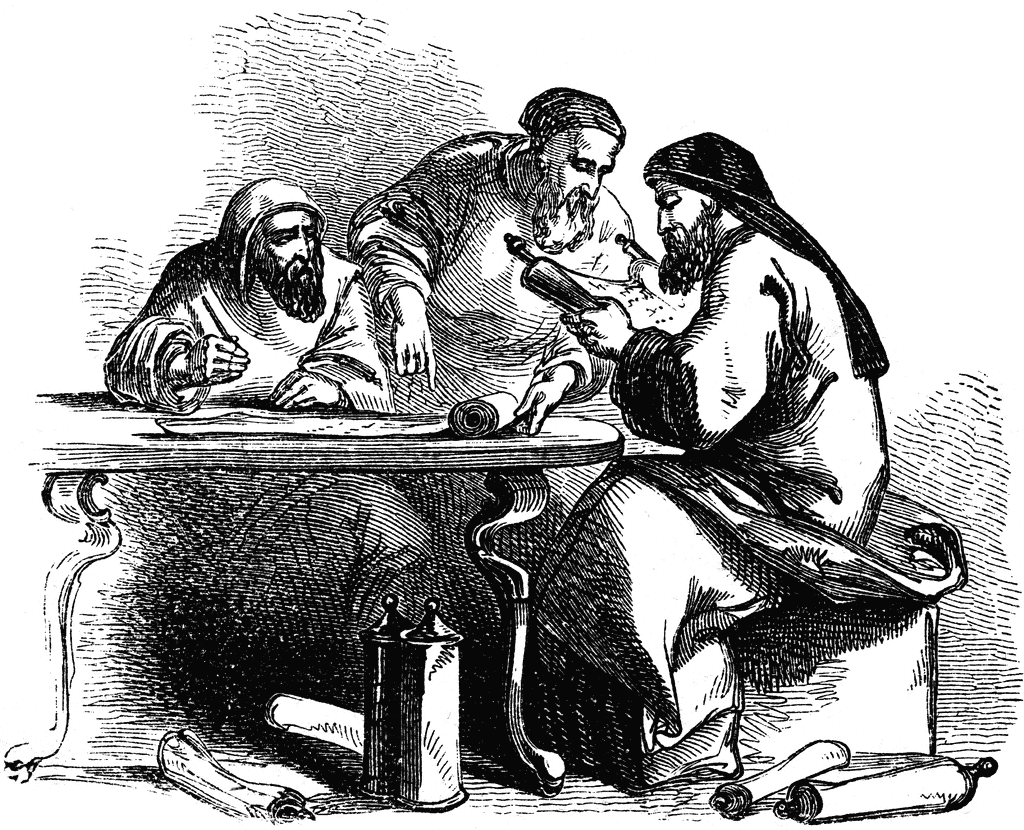If the Tanakh is a divinely-inspired work, how are contradictions possible? Don’t contradictions show multiple authors with multiple Codes of Law they are attempting to convey?
We will make a few points in attempt to understand contradictions in light of a divinely-inspired unified Law of God and a unified historical account presented in Torah. Many contradictions in Tanakh can be explained as being scribal errors. These contradictions usually are regarding numbers or names which are easy to mix up when the two letters are similar and there are only hand-written manuscripts.[i] See here for a discussion of the reliability of Torah in light of scribal errors.
Other contradictions are explained by the commentators on Tanakh, be it ancient rabbinic or modern academic commentary. They will usually put each case into perspective by providing context and/or showing that both facts are true and aren’t in contradiction with one another. Truth is, that each case must be dealt with on an individual basis. It should be noted that the ancient style of writing is very different than writing styles nowadays. Manuscripts of ancient times all reveal that people wrote less clearly than they do nowadays. In today’s culture, writing elaborately is expected from every author. Back then it wasn’t. And yes, Torah was written by human authors despite being divinely inspired. See “430 to 210: How Long were the Israelites in Egypt For” for an example of how we can deal with glaring contradictions in Torah.
Some inconsistencies aren’t contradictions per say. Rather they are different writing styles and phrases. For example, the first chapter of Genesis strictly refers to God as “Y-H-V-H” while in the second chapter He is consistently mentioned as “Y-H-V-H ELOKIM.” While this does not indicate contradiction, it does represent multi-authorship. The Torah was written by multiple authors either as scribes under Moses or as scribes spanning many generations. See here for a discussion on the authorship of Torah.
One less traditional approach to the issue is to assume different authors for different contradictions. This is the view of mainstream bible scholarship, although rejected by traditionalists. For example, different traditions and laws may have been widespread throughout different Israelite regions or times. These two traditions would have been written down by different authors reflecting their time and place’s beliefs. This would minimize the divinity of Torah, to some extent, although not necessarily rejecting it (see here).
Many alleged contradictions come from the direct mindset of multiple authors. Bible critics are adamant that Torah was written by multiple authors spanning generations. Therefore, as expected, different laws will change over time. Let us use one of the prime examples often brought as contradiction between the book of Leviticus and the book of Exodus. In Exodus (21:2-6), the law of the Hebrew slave is that they serve for 6 years and they have the option of voluntarily serving l’olam often translated as “forever.” Whereas in Leviticus (25:10) the slave is to be returned at the Yovel year (which occurs every 50 years). There seems to be a contradiction in which the law in Exodus says that the slave is kept forever and the law in Leviticus says that the slave is freed at the Yovel year. For a bible critic this may be a clear contradiction and it is no issue since the book of Exodus and the book of Leviticus were written by different people at different times.
But to the believer in Torah, this is no contradiction. Since the Torah is the single unified Law of God, then surely there must be an explanation for this contradiction. The contradiction is settled by context and a better translation of l’olam, the word often translated as “forever” in Exodus. Instead of translating the word l’olam as forever, a more accurate translation would be “indefinitely.”[ii] Thus, the law of the slave is the same in both Leviticus and Exodus. Except that in Exodus, they weren’t yet taught the Law of Yovel. Therefore the slave serves indefinitely. In Leviticus 25, the Israelites are taught the Law of Yovel in which all property and all people return to their ancestral origins. Therefore, the slave that was serving indefinitely is to now be returned to his or her tribal land.
There are many such alleged contradictions in which perspective (i.e. that Torah is the single unified Law of God) and context can answer the differences. Each case must be dealt with on their own.
There is one more point to be made, specifically in contradiction between Deuteronomy’s law and previous laws in the books of Exodus, Leviticus, and Numbers. Quite an interesting phenomena has been observed by many scholars. The legal laws in Deuteronomy often veer in the details from the laws as presented in earlier books of Torah. Many of these contradictions can be explained away by context, but there is another possibility. This theory is championed by Dr. Joshua Berman in his ani maamin book. This theory is based on the idea of Common Law and Statutory Law explained here. It is important to have an understanding of these concepts before proceeding.
If Common Law is allowed to develop, then within the 40 years between the writing of the earlier books and the writing of Deuteronomy, the laws would have developed to take on different details.[1] These details would have, therefore, been recorded differently in the beginning of the 40 years than by the end of the 40 years.
Let us bring one example to help illustrate the point. The Law of the Firstborn of every animal is that it must be given to the Kohen for their consumption. At least that’s the law as recorded in Numbers 18:15-19.
“The firstborn of the womb of every being, man or beast, that is offered to the Lord, shall be yours; but you shall have the first-born of man redeemed, and you shall also have the firstling of unclean animals redeemed…. All the sacred gifts that the Israelites set aside for the Lord I give to you [Aaron], to your sons, and to the daughters that are with you, as a due for all time. It shall be an everlasting covenant of salt before the Lord for you and for your offspring [the Kohanim] as well.”
But by the time we reach Deuteronomy 15:19-22, the law of the firstborn took on a whole new dimension. Instead of being given to the Kohen as a priestly gift, the firstborn animal is to be sacrificed in Jerusalem temple and eaten by the owner of the animal.
“You shall consecrate to the Lord your God all male firstlings that are born in your herd and in your flock: you must not work your firstling ox or shear your firstling sheep. You and your household shall eat it annually before the Lord your God in the place that the Lord will choose. But if it has a defect, lameness or blindness, any serious defect, you shall not sacrifice it to the Lord your God. Eat it in your settlements, the unclean among you no less than the clean, just like the gazelle and the deer.”
This is probably the hardest-to-explain contradiction between Deuteronomy and the earlier books – but this theory explains it well. The Law of the Firstborn has changed during the 40 years in the Wilderness. In the beginning (when Numbers was written), the law was that all the firstborn offerings were given to the Kohen and at the end of the 40 years in the Wilderness (when Deuteronomy was written) the law was that the owner himself can eat it along with his household.[2]
What made the law change? We cannot know for certain but we can speculate. The Law of the Firstborn in Numbers 18 comes just a little after the rebellion of Korach against the priesthood.[iii] This Law of the Firstborn may have been a reaction to the humiliation of the priesthood by Korach and his sympathizers. Moses – or God – would have changed the law that the priestly Kohanim now get all the firstborn animals as priestly gifts, in order to raise their status in the eyes of the Israelites. But by the end of the 40 years in the Wilderness, this concern may have waned to the point that the law was changed back to the original Law of the Firstborn in which the owner of the animal gets to eat the animal sacrifice.[3]
Theories like this can answer a number of apparent contradictions. We cannot know for sure what the exact answer to the contradictions are but these are all options on the table. For any practical issues in how to practice these laws that contain apparent contradiction, we turn to the legal authorities (i.e. the sages – see Deuteronomy 17:8-12) and follow their directive.
___________________
[1] Although only 40 years, the law would have changed drastically due to cultural changes. During these 40 years, the Israelites went through a lot and were developing from an Egyptian ex-salve culture to a sovereign nation of their own. They were carving out their own identity during these 40 years. Therefore much change in the Law is expected to have happened.
[2] The classical rabbinic approach (see Rashi on verse 20 based on Sifri; also see Ibn Ezra on verse 20) to attempt to reconcile the contradiction by radically interpreting Deuteronomy. Instead of referring to the owner, Moses is addressing the Kohen in the verse when saying that “you and your household” can eat it. But this interpretation is a far stretch. The addressees of Moses are clearly the regular non-Koehn Israelite (see verse 19), making it highly unlikely that the addresses change by the very next verse when there is no indication for such in the verse. A sober reading of the verses clearly show a contradiction between the Law of the Firstborn as described in Numbers.
If this theory, we are presenting here, is true, then the sages would have misunderstood the proper interpretation of Torah. This might have come from their understanding of Torah as a Statutory Law instead of Common Law. But even if they are mistaken in their interpretation, the law of the sages is binding and authoritative (see here). The very idea of Common Law is that the law as taught by the judges of the generation are binding, so we are certainly bound to the outcome of their (possibly mistaken) interpretation of Torah.
[3] The idea of God changing a law in Torah is no novel idea. There is a change in law in Deuteronomy 12:15-16 as compared to Leviticus 17. See also Midrash Devarim Rabbah 4:6,9 for examples of God changing the law even after the giving of the Torah.
[i] See https://www.jerusalemperspective.com/9459/
For a comprehensive discussion on this topic in Hebrew see http://www.yahadut.org.il/maamarim/nusach.pdf
[ii] See, e.g., Jeremiah 17:4 and Isaiah 32:14.
[iii] Numbers 16.




